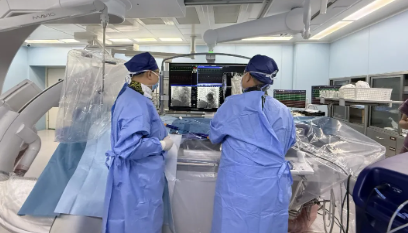- News
Shanghai General Hospital Successfully Performs PFA Procedure on 87-Year-Old Atrial Fibrillation Patient
https://mp.weixin.qq.com/s/mwil2gVQlFsSMymBgvaGvw
On June 19th, under the leadership of Professor Wang Fang, academic lead of the Cardiovascular Clinical Center, and Professor Wu Gang, Director of the Center, a multidisciplinary team from Shanghai General Hospital successfully performed a pulsed field ablation (PFA) procedure to treat long-standing persistent atrial fibrillation in an 87-year-old female patient. The operation, carried out in collaboration with the anesthesia team led by Deputy Director Huang Lina, was completed in just one hour. The patient quickly regained normal sinus rhythm after the procedure, marking another breakthrough in the hospital’s interventional treatment capabilities for atrial fibrillation.

The patient, a frail elderly woman weighing less than 50 kg, suffered from long-standing persistent atrial fibrillation complicated by heart failure and mild dementia. Recently, her condition worsened with poor heart rate control and severe symptoms, prompting her to seek treatment at the southern campus of Shanghai General Hospital.
Upon admission, the Cardiovascular Clinical Center promptly initiated a multidisciplinary team (MDT) evaluation. Experts unanimously agreed that while procedures such as AV node modification or left atrial appendage closure might offer partial relief, catheter ablation would provide the most effective and targeted treatment. However, given the patient's advanced age and frailty, she would likely be unable to tolerate conventional ablation techniques, which are typically time-consuming and carry greater procedural risk.
As a result, the team decided to adopt the innovative pulsed field ablation (PFA) technique under general anesthesia. Despite the high anesthetic risk due to the patient's advanced age, low weight, cardiac dysfunction, and frailty, the anesthesiology team, after thorough risk assessment, concluded that with current medical capabilities, the operation could proceed safely.
On the day of the surgery, guided by Professors Wang Fang and Huang Lina, Associate Chief Physician Huang Shiwei from the Department of Anesthesiology administered general anesthesia. Professors Wu Gang and Zhang Feng from the Department of Cardiology performed the ablation using a progressive technique—first isolating the bilateral pulmonary veins, followed by linear ablations of the left atrial roof, posterior wall, and mitral isthmus. The entire procedure lasted about one hour.
The patient’s atrial fibrillation was successfully terminated, and sinus rhythm was restored. Throughout the procedure, the patient's blood pressure, heart rate, and oxygen saturation remained stable. She awoke without discomfort and recovered well, able to get out of bed as early as the next day.
Pulsed field ablation (PFA) achieves precise myocardial ablation through targeted pulsed electric fields. Compared with traditional techniques, it offers shorter procedure times, greater tissue selectivity, and fewer complications. The success of this procedure underscores Shanghai General Hospital’s leadership in the interventional treatment of complex arrhythmias and offers a safer and more effective option for elderly, high-risk patients with atrial fibrillation.
Looking ahead, the team will continue to explore and apply cutting-edge technologies to advance the treatment of cardiovascular diseases—bringing renewed hope to more patients with heart rhythm disorders.
